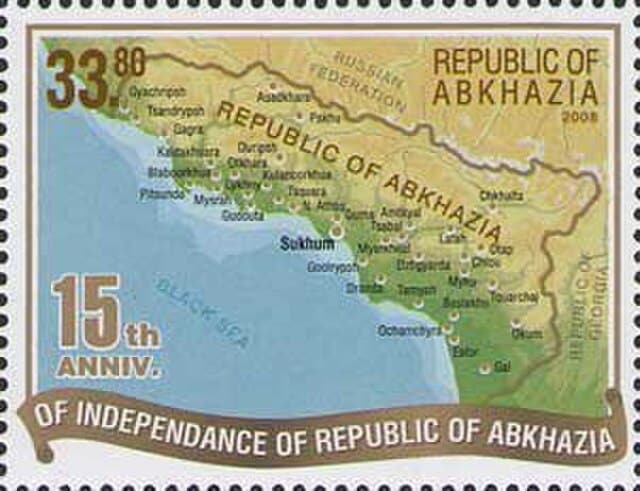Photo: Postage stamp of Abkhazia from 2008 - Wikimedia Commons
You would think Russia would have its hands full with its all-out war in Ukraine that has been going on for more than a year and a half now. However, Ukraine is not currently the only victim of Russian expansionism. Recently, the breakaway region of Abkhazia, internationally recognised as part of Georgia, has become the focus of Russia's regional power struggle. Russia is planning a permanent naval base in Ochamchira, Abkhazia. Where does this particular desire come from and what can be understood about Russia's relationship with Georgia, and Abkhazia in particular?
The history of Abkhazia
For most of the Soviet era, Abkhazia was an Autonomous Soviet Socialist Republic, within the Soviet Socialist Republic of Georgia. Ethnically, culturally and linguistically, Abkhazians differ from Georgians. Unrest after the break-up of the Soviet Union brought Abkhazia's status into question. Abkhazians feared that an independent Georgia would eradicate their culture and language, and their desire for greater autonomy escalated into the Georgian-Abkhaz conflict in 1992. Russian-backed separatists fought the Georgian army. Hundreds of thousands ethnic Georgians were driven out and the region seceded. Russia has recognised - as one of the only countries in the world - Abkhazia and South Ossetia, another breakaway region within Georgia's internationally recognised borders, as independent states since 2008. In that year, Russia and Georgia fought a war over the two territories. The result was a de facto annexation of the two regions by Russia. Since then, Russia has built military bases in both regions and Georgia considers the two regions, which cover more than 20% of its territory, to be occupied by Russia. Conflicts over Abkhazia have remained unresolved since then.
Diversification of military presence
As a result of occasional Ukrainian attacks on Russia's main naval base in Sevastopol in Crimea, Russia has launched a withdrew much of its Black Sea fleet. Looking for an alternative to Sevastopol, Russia is now intensifying its efforts for a base at Ochamchira. Formerly, during the time of the Soviet Union, there was a naval base there. Back in 2009, Russia mooted its desire, causing concern in the West. Now plans are becoming more concrete as Russia has signed an agreement for a permanent naval base with Aslan Bzhania, the leader of Abkhazia. Russian-backed Abkhazia is open to military cooperation with Russia as it offers them more military power and at the same time security against Georgia. Georgia says the move is a "gross violation of its sovereignty and territorial integrity" is.
Russia-Georgia relations
The relationship between Russia and Georgia has seen fierce divisions since Georgia adopted a pro-Western stance after the Rose Revolution in 2003. Russia has threatened to officially annex the two regions and accuses NATO of increasing tensions by raising the issue of Georgia's possible membership. Counterintuitively, the problematic relationship has been more stable recently, taking into account Russia's invasion of Ukraine. Georgia did not join the sanctions against Russia and, in response, Russia abolished the 20-year-old visa requirement for Georgian citizens. The stable ties can be explained by the Georgia's growing regional importance. Georgia acts as an alternative corridor for the EU towards Central Asia and China. With Russia focusing on Ukraine, its influence in the South Caucasus is waning, while Georgia has become an important axis to circumvent sanctions. Now that Georgia has more to offer, it can increase its influence and provide a new opportunity for reconciliation between Abkhazia and Georgia. Russia should also have an interest in this, as an open and stable border with Georgia can save Russia from international exclusion.
Russian irredentism
Putin has stated several times that the collapse of the Soviet Union was the "worst geopolitical catastrophe" of the 20th century. Millions of Russians were suddenly living in newly independent countries. Putin has apparently made it his life's work to reclaim Soviet territory and reunite all Russians into a Greater Russia. This goal is being irredentism called expansionism - the act by which a state seeks to annex territories of other countries to its own, either because of historical claims or the presence of people of the same language and ethnicity. Putin's foreign policy is expansionist to say the least. Under the guise of protecting ethnic Russians, Moscow actively expands its sphere of influence with notorious policies in the "near abroad". For example, the issuing Russian passports to people in northern Kazakhstan, southeastern Ukraine and other regions where large numbers of ethnic Russians live.
Russia has an interest in creating unrest in its "near abroad" by fomenting secessionist movements to contain the power of its neighbours and increase their political dependence on Moscow. Russia's annexation of Crimea and parts of south-eastern Ukraine are prime examples of Russian irredentism. Although Moscow's role in its neighbours has come under serious strain, the Russian regime is still trying to increase its military presence alongside Ukraine, for example in Abkhazia. This should be closely monitored and Georgia deserves all support from Western actors to protect and preserve its sovereignty.





